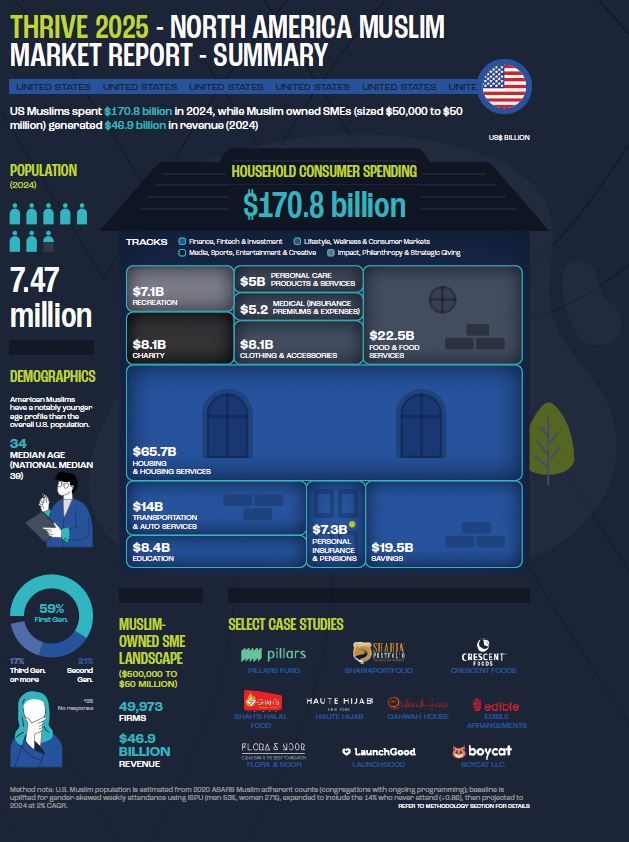US-based, Muslim-owned SMEs net $46.9bn in revenue, as halal goes mainstream
Muslim-led small and medium enterprises (SMEs) across the United States raked in $46.9 billion in 2024, as a new generation of young American Muslims seize entrepreneurial opportunities and growing market opportunities.
The Thrive 2025 - North America Muslim Market Report, produced by DinarStandard, revealed that 49,973 SMEs based in the US garnered close to $47 billion last year.
Firms based in California, Toronto CMA (census metropolitan area), Florida and New York comprised 67.2% of the top 10 regions.
Infrastructure and support services firms comprise nearly half of the total SME pool (44%), whereas other firms are concentrated across lifestyle, wellness and consumer markets (35%), followed by finance and impact each with ~9–10%, and media, with ~3–4%.

The report estimates that US-based Muslim households spent $170.8 billion in 2024, while Muslims in the Toronto CMA spend $15.8 billion, based on the study’s estimated 2024 population of 7.47 million Muslims in America, and approximately 725,432 in the Toronto CMA.
American Muslims have a notably younger age profile than the overall US population, with 77% under the age of 50. The community also showcases a layered immigrant-origin profile, combining first-generation representation with substantial second- and third-generation cohorts.
“The proliferation of high-quality Yemeni coffee shops like Qahwah House, Haraz and Qamaria are a manifestation of uniquely American style, third space coffee shops. American-made Habibi Oud perfumes, modest fashion brands VELA and Haute Hijab, fintech companies such as Zoya and Manzil, and crowdfunding platform LaunchGood all exemplify a new level of original Muslim entrepreneurial confidence and maturity,” the report read.
Halal, has become a uniquely health-conscious and ethical trend, going mainstream through outlets like Halal Guys and other nationally expanding chains. Halal offerings from brands such as Crescent Foods and Saffron Road have owned shelf space in retail arenas, from Whole Foods to Costco.
The emergence of alternative national media platform Zeteo and Boycat, a platform for ethical alternative products, is also reflecting a rise in ethical consumer activism driven by Muslims. These are besides the thousands of small businesses such as clinics, convenience stores, gas stations, and investment platforms, owned and operated by Muslims.
Key report findings also revealed housing finance, investments/savings, and personal insurance and pensions as the top three unmet needs across the American Muslim diaspora, indicating demand for transparent, compliant financial products and affordable care pathways.
You can access the Thrive 2025 - North America Muslim Market Report here.

Salaam Gateway